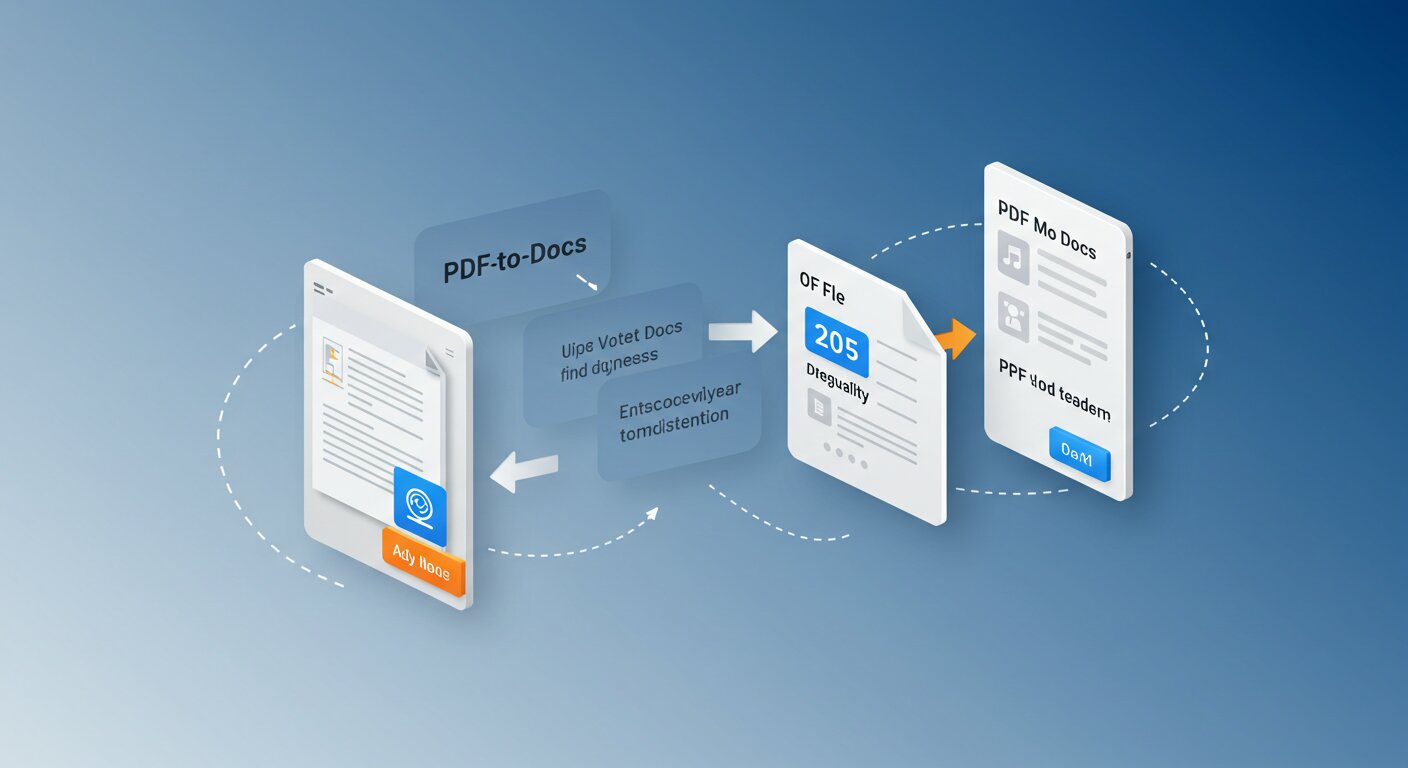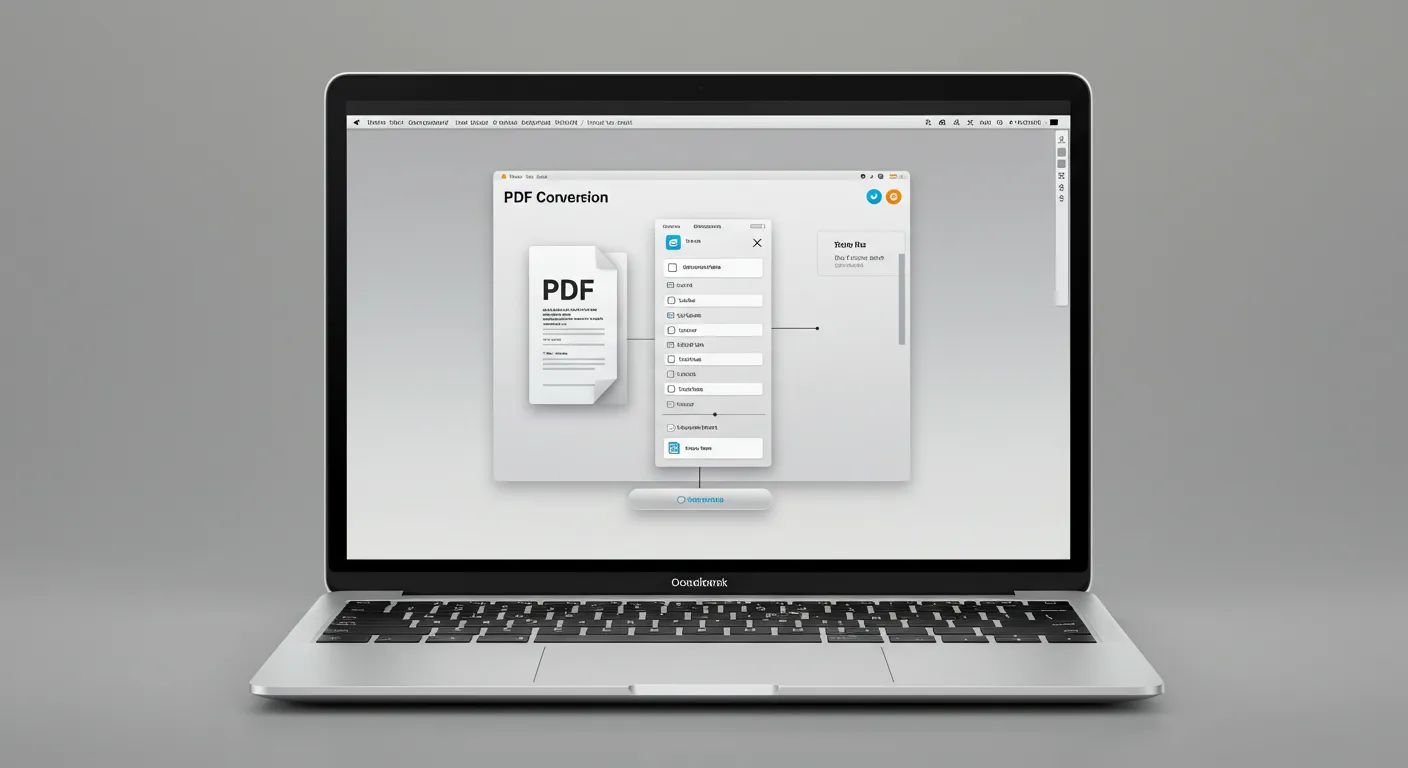PDF to DOCX Conversion for Students and Educators: Academic Success Guide
Table of Contents
- Why PDF to DOCX Conversion is Essential in Education
- Common Academic PDF Challenges
- Converting Research Papers and Journal Articles
- Handling Textbook Content and Course Materials
- Collaborative Academic Writing and Editing
- Accessibility in Educational Documents
- Citation and Reference Management
- Privacy Considerations for Student Work
- Time-Saving Techniques for Busy Students
- Best Practices for Educators
- Conclusion
Academic life revolves around documents—research papers, assignments, lecture notes, and textbooks. While PDFs are the standard for distributing academic content, their limited editability creates significant challenges for students and educators. This comprehensive guide explores how converting PDFs to DOCX format can enhance learning, teaching, and research in educational settings.
Why PDF to DOCX Conversion is Essential in Education
The academic world presents unique document challenges that make PDF to DOCX conversion particularly valuable:
For Students
- Assignment Completion: Incorporating research material into papers and projects
- Note-Taking Enhancement: Adding personal notes to lecture materials
- Research Efficiency: Extracting and organizing information from multiple sources
- Collaboration: Sharing editable content with study groups and project teams
- Submission Requirements: Meeting instructor requirements for document formats
For Educators
- Course Material Development: Updating and customizing teaching resources
- Feedback Provision: Adding detailed comments and suggestions to student work
- Curriculum Adaptation: Modifying materials to meet diverse learning needs
- Resource Creation: Developing handouts, study guides, and assessments
- Accessibility: Ensuring materials are accessible to all students

Common Academic PDF Challenges
Students and educators frequently encounter these PDF-related obstacles:
Research Limitations
- Inability to highlight or annotate research papers
- Difficulty extracting quotes and data for citations
- Challenges in organizing information from multiple sources
Content Restrictions
- Textbook sections that can’t be incorporated into notes
- Course materials that can’t be customized for learning needs
- Lecture slides that can’t be annotated with personal insights
Collaboration Barriers
- Group projects hindered by non-editable formats
- Peer review processes complicated by format limitations
- Teaching assistants unable to modify materials for discussion sections
Accessibility Issues
- Screen readers struggling with poorly structured PDFs
- Font size and contrast issues affecting readability
- Navigation difficulties for users with disabilities
Converting these academic PDFs to DOCX format addresses these challenges by creating editable, adaptable documents.
Converting Research Papers and Journal Articles
Academic research often involves working with PDF journal articles and research papers:
Effective Conversion Strategies
- Use OCR-enabled conversion for scanned research papers
- Maintain citation information during conversion
- Preserve tables and figures with proper formatting
- Retain footnotes and endnotes in their proper location
- Keep mathematical equations and special characters intact
Post-Conversion Organization
- Create a research database of converted articles
- Tag documents by subject, author, or research question
- Extract key quotes and findings into a master document
- Develop annotation systems for literature reviews
- Build citation libraries from converted documents
Common Research Paper Conversion Issues
- Complex multi-column layouts may require reformatting
- Mathematical notation might need manual correction
- Reference sections often need formatting adjustments
- Figures and captions may separate during conversion
Our browser-based converter is optimized to handle academic papers while preserving critical elements like citations, tables, and specialized formatting.
Handling Textbook Content and Course Materials
Educational materials present unique conversion challenges:
Textbook Conversion Considerations
- Focus on converting only necessary sections (not entire books)
- Maintain proper attribution and copyright compliance
- Preserve complex diagrams and illustrations
- Keep chapter structures and section numbering
- Retain sidebars and supplementary content
Course Material Enhancement
- Convert lecture slides to editable format for note-taking
- Transform static worksheets into interactive exercises
- Adapt assessment materials for different learning levels
- Create editable study guides from course readings
- Develop customized learning resources from standard materials
Legal and Ethical Considerations
- Understand fair use provisions for educational purposes
- Maintain proper attribution for all converted content
- Respect copyright restrictions on commercial textbooks
- Consider institutional policies on content modification
- Use converted materials for personal educational use only
Collaborative Academic Writing and Editing
Converting PDFs to DOCX facilitates academic collaboration:
Group Project Workflows
- Convert reference materials to editable format
- Create shared document repositories
- Implement version control for collaborative editing
- Establish style consistency across team contributions
- Develop integrated citation practices
Peer Review Processes
- Enable in-line commenting and suggestion tracking
- Facilitate targeted feedback on specific sections
- Support iterative improvement through multiple revisions
- Allow simultaneous review by multiple peers
- Create comparison documents showing changes between versions
Faculty-Student Collaboration
- Enable professors to provide editable templates
- Allow students to submit drafts for detailed feedback
- Facilitate research mentorship through shared documents
- Support teaching assistant feedback on assignments
- Enable collaborative writing for publication
Accessibility in Educational Documents
Converting PDFs to DOCX can significantly improve document accessibility:
Accessibility Advantages of DOCX
- Better compatibility with screen readers
- Easier font size and contrast adjustments
- Simplified navigation through document structure
- More accessible tables and data presentation
- Improved alt text implementation for images
Creating Accessible Converted Documents
- Use proper heading structures for document organization
- Add alt text to all images and diagrams
- Create accessible tables with proper headers
- Use built-in styles rather than manual formatting
- Verify accessibility using Word’s accessibility checker
Supporting Diverse Learning Needs
- Adapt materials for students with visual impairments
- Modify content for different reading levels
- Create alternative formats for various learning styles
- Develop simplified versions of complex materials
- Enhance visual elements for better comprehension
Citation and Reference Management
Managing citations is a critical aspect of academic work:
Citation Preservation During Conversion
- Ensure footnotes and endnotes remain properly linked
- Maintain bibliographic formatting during conversion
- Preserve citation numbering and reference markers
- Retain author-date citations in proper format
- Keep citation page numbers accurate
Integration with Reference Management Software
- Connect converted documents with Zotero, Mendeley, or EndNote
- Import citations from converted PDFs into reference libraries
- Use Word’s citation tools with converted documents
- Create dynamic bibliographies from converted content
- Maintain citation metadata during document evolution
Citation Formatting After Conversion
- Apply consistent citation styles (APA, MLA, Chicago, etc.)
- Fix common conversion errors in reference sections
- Standardize citation formats across multiple sources
- Verify citation accuracy after conversion
- Update citations to reflect the latest style guidelines
Privacy Considerations for Student Work
Privacy is particularly important in educational contexts:
Student Data Protection
- Avoid uploading sensitive assignments to third-party converters
- Protect personal information in converted documents
- Maintain FERPA compliance with student materials
- Secure converted documents containing grades or feedback
- Remove identifying information when appropriate
Secure Conversion Options
- Use browser-based tools that process documents locally
- Avoid conversion services requiring account creation
- Select tools that don’t store uploaded documents
- Prefer converters with clear privacy policies
- Consider institutional recommendations for document handling
Our browser-based converter provides maximum privacy by processing documents entirely within your browser, ensuring student work and educational materials never leave your device.
Time-Saving Techniques for Busy Students
Efficient conversion strategies help students manage heavy workloads:
Batch Processing for Multiple Documents
- Convert reading assignments at the beginning of the semester
- Process research materials in groups by topic
- Convert and organize course materials by unit or module
- Prepare document libraries before intensive research periods
- Develop conversion routines for regular academic tasks
Strategic Partial Conversion
- Identify and convert only the most relevant sections
- Focus on content requiring annotation or extraction
- Convert key reference materials for frequent access
- Prioritize conversion of complex tables and data
- Be selective about image-heavy content
Integration with Study Workflows
- Convert materials before reading sessions
- Organize converted documents in study-friendly structures
- Develop annotation systems for converted content
- Create master documents from multiple converted sources
- Establish regular backup routines for academic work
Best Practices for Educators
Faculty and teaching staff can optimize PDF conversion for educational purposes:
Course Material Development
- Convert and update materials between academic terms
- Create editable templates for student assignments
- Develop customizable rubrics and assessment tools
- Prepare adaptable lesson plans and activities
- Design flexible learning modules from static content
Feedback and Assessment
- Convert student submissions for detailed feedback
- Create comment libraries for common feedback points
- Develop interactive grading rubrics from static forms
- Track changes and improvements across multiple drafts
- Provide accessible feedback for all students
Institutional Considerations
- Align conversion practices with institutional policies
- Consider departmental standards for document handling
- Coordinate with disability services for accessibility needs
- Develop consistent approaches across course sections
- Share conversion resources with colleagues and students
Conclusion
Converting PDFs to DOCX format empowers students and educators to overcome the limitations of static documents, enabling more effective learning, teaching, and research. By making academic content editable, these conversions support better note-taking, enhanced collaboration, improved accessibility, and more efficient research processes.
Our browser-based PDF to DOCX converter offers an ideal solution for academic needs—it’s free, respects privacy by processing documents locally, requires no software installation, and preserves the complex formatting often found in academic materials.
Whether you’re a student working on research papers, an educator developing course materials, or a researcher collaborating on publications, having the ability to convert PDFs to editable formats can significantly enhance your academic effectiveness.
Ready to transform your academic documents? Try our free online PDF to DOCX converter now and experience the benefits of fully editable academic content.
For educational institutions interested in bulk conversion solutions or accessibility guidance, please contact our education support team for additional resources.
